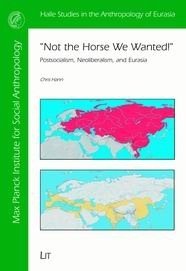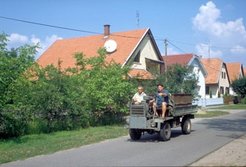The New Property System in Tázlár (2000-2005)
This project was my empirical contribution to the Department's first Focus Group, "Property Relations". The main fieldwork was carried out in Summer 2001 and these pages stem from that year (with some preliminary writing-up in 2003). More detailed results are presented in the comprehensive Focus Group Report: Property Relations: the Halle Focus Group 2000-2005.
Further detail can be found in:
Chris Hann. 2006 Not the Horse We Wanted! Postsocialism, Neoliberalism and Eurasia, Münster: LIT, pp. 43-90.

This project is concerned with the Hungarian experience of decollectivization. It is an interesting case for several reasons, notably the fact that collective farms seemed to work more efficiently in Hungary than anywhere else in the Soviet bloc. Tázlár, the community that I studied in the 1970s, exemplified the flexibility of this 'Hungarian road to socialism'. The members of its 'specialist cooperative' (szakszövetkezet) were in practice able to continue traditional patterns of family farming; even though their property rights were significantly weakened through the implementation of socialist ideology, the later consolidation of a 'market socialist' mechanism brought modernization and unprecedented prosperity to most sections of the community.
How had this mechanism survived the transition to a capitalist market economy? How had the land been redistributed, given the general policy to provide 'compensation' to the victims of socialist appropriation, rather than restoring former holdings in their original boundaries? Who were the winners and losers in this process?


I was able to revisit Tázlár for almost two months in summer 2001, twenty-five years after my first arrival in the community. The main results of this work are reflected in Working Paper 26. I surveyed almost all the 60 households in the community's upper hamlet, attended many meetings and interviewed some of the leading figures of the 1970s, now in retirement and in some cases much happier to talk openly than they had been in socialist days. Many discussions concentrated on the economic problems of agriculture and the depressed local labour market. There was widespread disillusionment, even among those who now held exactly the plots they had applied for as their private property once again. Others fault Hungary's 'compensation' legislation for not doing enough to ensure that plots were returned to the original owners. It was commonly alleged that the committee members who managed the redistribution process had acted in the interests of their own families and friends. Similar reproaches were made of the leaders of the cooperative, which gave up its land and all productive activities in agriculture in 1990, but with two small factories remains by far the major employer in the community.


